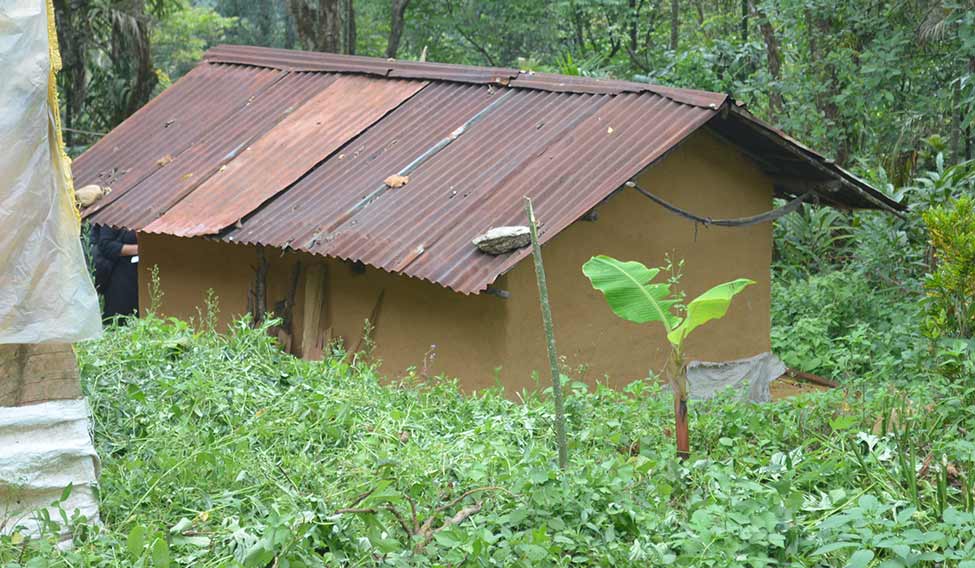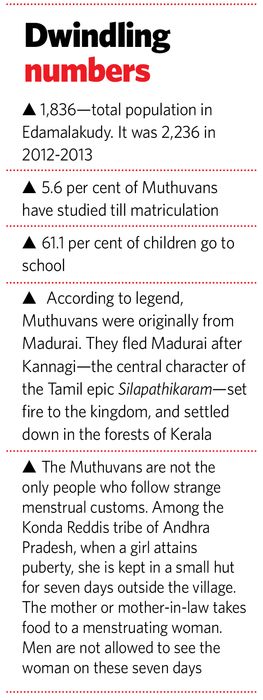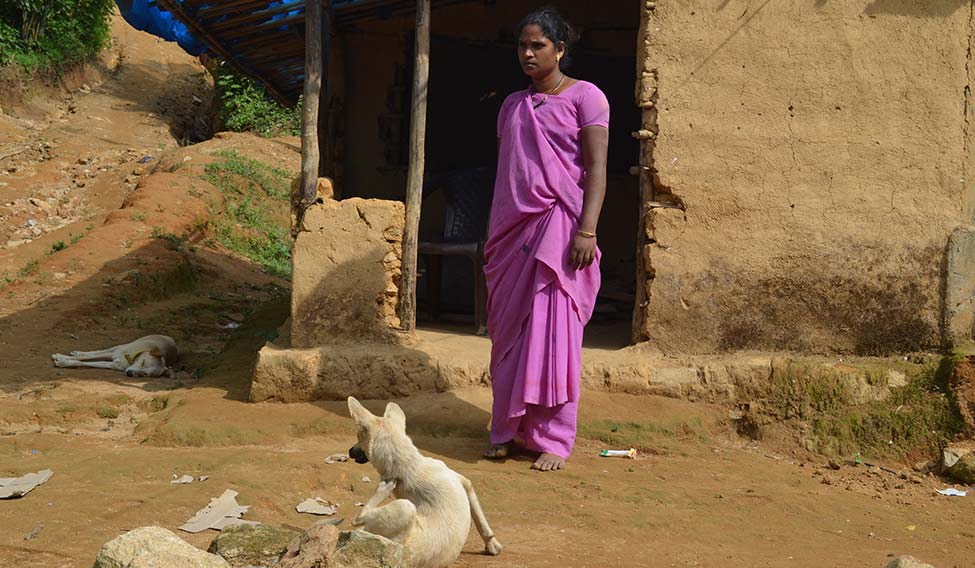Laila was in the first day of her menstrual period. And she was in no mood to meet an outsider. Sitting alone in the tiny hut where one could barely squeeze in, she looked desolate. There was an eerie silence inside the hut and it had a strange smell. Laila had to spend a few more days in the hut, located at the edge of the forest, before she could return home. And she was waiting....
Laila, 18, belongs to the Muthuvan tribe and lives in the Edamalakudy tribal panchayat, a cluster of 26 hamlets, near Munnar in Idukki district of Kerala. It is the state's first and only tribal panchayat, and Prime Minister Narendra Modi once mentioned it in his monthly radio programme Mann Ki Baat. Modi described it as a “remote tribal village where people hardly go’’. “One has to travel through forest for a full day to reach there,’’ he said.
Laila lives in one such hamlet, totally cut off from the rest of the world. Unlike other adivasi communities, the Muthuvans have limited their interaction with the outside world to preserve their culture and traditions. Among the Muthuvans, menstruating women are considered to be impure and supposed to bring bad luck to their menfolk. So they are made to stay in a specially designated place called valaymapura, a tiny hut on the outskirts of the village, during those days. “Men are not supposed to see me. Something bad will happen to my husband or father if I violate the custom,’’ says Laila, who has been religiously following the custom ever since she attained puberty. “What can we do? These are age-old traditions we have to follow.”
According to Natarajan, a traditional healer, the system of valaymapura was introduced to give women complete rest. “The idea of purity was imposed so that they followed the custom,” he says. “But the condition of the valaymapura must be improved.”
The menstruating women are expected to stay inside the hut at all times. Other women bring food and water to them. There have been cases of attack by wild animals. Women have also been molested by outsiders. “It is like living in a jail for days together. There is nobody to talk to. We have to cook in such a dirty space. It is such a pain. That is why many women take Mala D pills,’’ says Laila.
In the 90s, the state government started distributing Mala D, a contraceptive pill, to control the tribal population. The women soon discovered that the pill could delay menstruation so they started taking it regularly and introduced their daughters to it. Soon, even the roadside tea shop near Edamalakudy started selling the pills. When the situation went out of control, the government stepped in and banned the sale of the pills in and around Munnar.
Did Laila ever take the pill? “I was tempted to, but didn't because I know it would create a problem when I want to have a baby,” says Laila. “I know many women who do not have babies because they took Mala D regularly.’’
 Banished from home: A tiny hut called valaymapura on the outskirts of the village where women are forced to stay during menstruation | Prasad Ambattu
Banished from home: A tiny hut called valaymapura on the outskirts of the village where women are forced to stay during menstruation | Prasad Ambattu
Manju, 28, started taking Mala D at age 14. “I used to take the pill for years as I hated staying in valaymapura,” she says. “I would be all alone for days together.”
It was a friend who told Manju about the “use of the pill”. After she got married at age 19, her husband, Rangarajan, started getting her the pills. “It is very tough for women to stay alone in valaymapura. Manju used to cry, so I got her the pills,’’ says Rangarajan. The couple has been trying to have a baby for the past few years without any luck. “The doctors say I haven't been able to conceive because I took Mala D for so many years, “ says Manju. “I have stopped taking it, but still I haven't been able to conceive.”
Manju is not alone. As per official figures, there are 325 couples of childbearing age in Edamalakudy, of whom 100 are childless. Unofficial records, however, hint at a higher figure. Some couples have been married for more than five years. Every kudi or hamlet has at least five childless couples.
After the government introduced birth control pills, the number of births has dropped to 20 a year. As per the health department figures, the population has come down from 2,236 in 2012-2013 to 1,836 in 2016-2017. “There was a time when every Muthuvan household had seven or eight kids. Now Muthuvans are a rare tribe. If the government does not intervene urgently, the tribe would become extinct,’’ says Balakrishnan Triparath, Kerala president of All India Confederation of SC/ST Organisations.
The Muthuvan women are generally very shy, especially around men. But some of them have travelled to Munnar town and even to neighbouring Tamil Nadu to get the pills. “The health department has given directions to the medical shops in Munnar to stop selling contraceptives. We also organise awareness programmes,’’ says Dr Archana S.P., medical officer at Devikulam community health centre. Edamalakudy comes under Devikulam taluk.
Every month, Archana treks to the hamlets in Edamalakudy, braving the leeches and wild animals, to talk to the women there. “Dr chechy [sister] has been telling us to stop using the pills. She said it can even cause cancer,’’ says Mallika, who is childless and in her 30s.

The shops in Tamil Nadu are charging more for the pills. But price is not an issue for women in Edamalakudy who earn quite well from cardamom and pepper cultivation. Most families have been given forest land, some 3 acres, others up to 20 acres, for cultivation.
The government is doing everything possible to dissuade the women from taking the pills. Regular awareness classes are being organised, says E.I. Najeeb, one of the four nurses appointed in Edamalakudy. “The birth rate had come down drastically in the past one decade. But it is showing signs of improvement,” he says.
However, a fallout of the awareness programme is that women have now become very secretive about taking the pills. “Many still take it, but don't talk about it. Some women don't tell even their husbands,” says Radha, who claims to have stopped the pills a year ago. The women hide the pills in a pit in the kitchen, she says.
Eeswari, a member of the Edamalakudy tribal panchayat told The WEEK that popping pills is a thing of the past. “Our women now know the negative effects. So they have stopped taking it,’’ she says.
According to Vijayalakshmi, an anganwadi teacher who has been teaching tribal kids for the past 20 years, the problem is with the perception about the pills. “They see these tablets as something which gives them the power to control their lives,’’ she says. For families that own cardamon plantation, missing even a single day's work would affect their production. “Women who are menstruating are not supposed to go into the forest because the tribals believe it would anger the gods. So the women take the pills every day,” says Archana.
Vijayalakshmi, however, is hopeful that things will change. “When I came to Edamalakudy 20 years ago, the women were not allowed to wear chappals or hold an umbrella. Now they are using both,” says Vijayalakshmi. “So, the change will happen, but it will take time.’’
The government needs to do a study on the drop in the fertility rate in the Muthuvan community, says former vigilance director Jacob Thomas, who has stayed in these tribal hamlets to understand the situation and formed a research team to study the problem. The report would be submitted to the government soon.
The women should be subjected to a detailed examination by a gynaecologist, suggest Archana. “If the women get proper treatment,” she says, “they may be able to conceive.”








